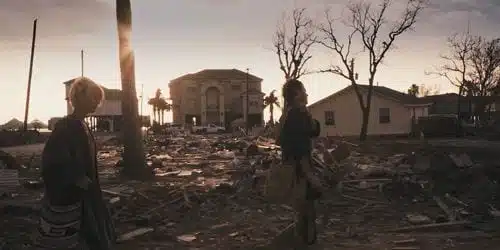
The titular creatures in Monsters appear in their full glory — towering and iridescent — only at film’s end. Unfortunately, getting to that moment requires spending 90-plus minutes with a pedestrian human couple, completely lacking any romantic spark, whose arduous return from Mexico to the United States provides opportunities for rather heavy-handed social commentary.
The man is Andrew Kaulder (Scoot McNairy), a supposedly jaded news photographer. He works for an unnamed media mogul’s “publication.” (Newspaper? Blog? The film doesn’t make this clear, which would be fine if Kaulder didn’t take such pains to say “publication” rather than the more specific, natural-sounding term.) In southern Mexico he covers the Infected Zone, a swath of territory taken over by alien cephalopods six years earlier. His job, as he explains it, involves taking pictures of suffering or dead children, because no one pays for pictures of happy children.
His opposite number is Sam (Whitney Able), the mogul’s daughter, who receives a minor injury just outside the Infected Zone. Her father tasks Kaulder with getting her back to the United States; after drinking too much tequila at the border crossing, Kaulder lets their passports get stolen. The two will now have to cross the border illegally, somehow making it on foot through the Infected Zone and over a massive wall erected to keep out the “aliens.” (Calling the film “Aliens” apparently would have been too on the nose.)
This setup for Gareth Edwards’ low-budget science film sounds like an especially bad spring break trip, and Sam and Kaulder generally conduct themselves like spoiled suburbanites. In fairness, toward the end, they self-consciously point this out, but their ongoing cluelessness about everything becomes grating — and unrealistic, given Kaulder’s profession. Early in their trip, Sam asks, “Doesn’t it kind of bother you… that you need something bad to happen to profit?” Kaulder replies, “You mean like a doctor?” This exchange marks one of the crisper moments in the semi-improvised dialogue. Too many of their conversations do less to build character than make political points. During their journey, Sam asks their gun-toting guides (the film’s analog of coyotes), “Do you think the wall will keep the creatures out of America?” Before they can answer, Kaulder pipes up, “You can’t fight nature.” Sam agrees: “It’s imprisoning ourselves.” Full of good intentions almost in spite of themselves, Sam and Kaulder ask questions in order to come up with their own clichéd answers.
The purple-haze philosophizing continues as they make their way up a debris-strewn river, fighter planes downed on the banks, freighters in the trees (cf. Apocalypse Now and Aguirre, The Wrath of God). Their guides show no surprise at the sights; the post-catastrophe border economy has boosted illegal travel and violent encounters with both authorities and creatures. Legal crossing via ferry costs $5000 (though it comes with a free gas mask): “You have the money, or you take the risk,” the ferry operator tells them.
Sam and Kaulder take the risk, and soon they’re witnessing actual suffering. People begin to die, Sam is sometimes tearful. Yet, curiously, they suffer no physical injuries — walking incarnations of American exceptionalism. They’re free to sit atop a ruined Mayan temple (somehow located just south of the Rio Grande) and gaze at their nation’s skyscraping wall. “It’s different looking at America from the outside, in,” they opine. So true.
Too frequently, Monsters shares Sam and Kaulder’s disillusioned but fundamentally shallow perspective. Kaulder photographs threadbare American flags waving in the wind like a post-apocalypse Robert Capa. A homeless woman barks insanely at the couple, and what’s she wearing around her neck? An American flag. And of course it’s American planes dropping chemical weapons on the benign, tree-hugging aliens (literally: their spawn grow on trees). This is allegory by sledgehammer.
If Monsters recalls District 9, it’s also the case that science-fiction films regularly allegorize class, nation, and labor-relations. But the combination of forced on-the-road romance and forced cultural critique makes Monsters less allegorical than unbelievably literal.
